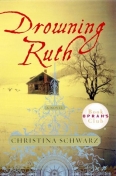BKMT READING GUIDES
Drowning Ruth
by Christina Schwarz
Hardcover : 352 pages
3 clubs reading this now
1 member has read this book
Introduction
Deftly written and emotionally powerful, Drowning Ruth is a stunning portrait of the ties that bind sisters together and the forces that tear them apart, of the dangers of keeping secrets and the explosive repercussions when they are exposed. A mesmerizing and achingly beautiful debut.
Winter, 1919. Amanda Starkey spends her days nursing soldiers wounded in the Great War. Finding herself suddenly overwhelmed, she flees Milwaukee and retreats to her family's farm on Nagawaukee Lake, seeking comfort with her younger sister, Mathilda, and three-year-old niece, Ruth. But very soon, Amanda comes to see that her old home is no refuge--she has carried her troubles with her. On one terrible night almost a year later, Amanda loses nearly everything that is dearest to her when her sister mysteriously disappears and is later found drowned beneath the ice that covers the lake. When Mathilda's husband comes home from the war, wounded and troubled himself, he finds that Amanda has taken charge of Ruth and the farm, assuming her responsibility with a frightening intensity. Wry and guarded, Amanda tells the story of her family in careful doses, as anxious to hide from herself as from us the secrets of her own past and of that night.
Ruth, haunted by her own memory of that fateful night, grows up under the watchful eye of her prickly and possessive aunt and gradually becomes aware of the odd events of her childhood. As she tells her own story with increasing clarity, she reveals the mounting toll that her aunt's secrets exact from her family and everyone around her, until the heartrending truth is uncovered.
Guiding us through the lives of the Starkey women, Christina Schwarz's first novel shows her compassion and a unique understanding of the American landscape and the people who live on it.
Oprah Book Club® Selection, September 2000: For 19th-century novelists--from Jane Austen to George Eliot, Flaubert to Henry James--social constraint gave a delicious tension to their plots. Yet now our relaxed morals and social mobility have rendered many of the classics untenable. Why shouldn't Maisie know what she knows? It will all come out in family therapy anyway. The vogue for historical novels depends in part on our pleasure in reentering a world of subtle cues and repressed emotion, a time in which a young woman could destroy her life by saying yes to the wrong man. After all, there was no reliable birth control, no divorce, no chance of an independent life or a scandal-free separation.
Christina Schwarz's suspenseful debut pivots on two of the lost "virtues" of the past: silence and stoicism. Drowning Ruth opens in 1919, on the heels of the influenza epidemic that followed the First World War. Although there were telephones and motor cars and dance halls in the small towns of Wisconsin in those years, the townspeople remained rigid and forbidding. As a young woman, Amanda Starkey, a Lutheran farmer's daughter, had been firmly discouraged from an inappropriate marriage with a neighboring Catholic boy. A few years later, as a nurse in Milwaukee, she is seduced by a dishonorable man. Her shame sends her into a nervous breakdown, and she returns to the family farm. Within a year, though, her beloved sister Mathilde drowns under mysterious circumstances. And when Mathilde's husband, Carl, returns from the war, he finds his small daughter, Ruth, in Amanda's tenacious grip, and she will tell him nothing about the night his wife drowned. Amanda's parents, too, are long gone. "I killed my parents. Had I mentioned that?" muses Amanda.
I killed them because I felt a little fatigued and suffered from a slight, persistent cough. Thinking I was overworked and hadn't been getting enough sleep, I went home for a short visit, just a few days to relax in the country while the sweet corn and the raspberries were ripe. From the city I brought fancy ribbon, two boxes of Ambrosia chocolate, and a deadly gift... I gave the influenza to my mother, who gave it to my father, or maybe it was the other way around.Schwarz is a skillful writer, weaving her grim tale across several decades, always returning to the fateful night of Mathilde's death. Drowning Ruth displays her gift for pacing and her harsh insistence on the right ending, rather than the cheery one. --Regina Marler
Discussion Questions
No discussion questions at this time.Book Club Recommendations
Recommended to book clubs by 1 of 3 members.
Book Club HQ to over 88,000+ book clubs and ready to welcome yours.
Get free weekly updates on top club picks, book giveaways, author events and more








